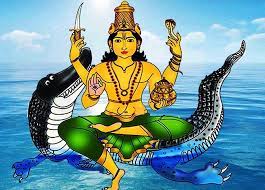


Hinduism is filled with numerous formidable Gods and Goddesses with extraordinary divine powers. Most are aware of the mythologies of popular deities such as Krishna, Durga, Ganesha, among many others. However, there are several Gods and Goddesses whose intriguing tales are not celebrated by many yet. Let’s take a look at one of the lesser-known Gods of Indian mythology – Lord Varuna.
Venerated as the God of Water, Lord Varuna and his influence expand to the underwater universe. The Hindu Goddess Varuni is believed to be his consort. His mount is said to be the Makara (mythical sea-creature or crocodile) and his weapon of choice is the Pasha (noose). Lord Varuna is a deity who is believed to be the guardian of the western direction.
As per the Puranas, Lord Varuna is the son of Sage Kashyapa and one of the twelve Gods regarded as Adityas, thanks to their origin from the Mother of Gods, Aditi. In a couple of texts from the Hindu scriptures, he is regarded as the father of the Vedic sage Vasishtha.
Varuna is considered to be the lord of the waters and was assigned the job of controlling the clouds and rains. Thus, he is revered as the King of Waters and manages the river, seas, oceans and all the water bodies. It is also a widely held assumption that worshipping the deity shields us from thunder and lightning.
Lord Varuna is mentioned in Japanese Buddhist mythology as Suiten. He is also worshipped among Jains.
Lord Varuna is believed to be one of the most ancient deities in Hinduism and is regarded as a universal monarch. Formerly, Varuna was considered to be the King of Gods who held the most power in Vedic India. In Rigveda, Varuna is thought to be the keeper of the moral law, one who disciplines those who commit a sin without any mercy, and who pardons those who do something wrong and are apologetic about it. His connection with water bodies such as oceans and rivers is extensively cited in the Vedas. Hymn 10.123 of the Rigveda describes Hiranyaksha (golden-winged bird) as the messenger of Varuna.
Lord Varuna and Lord Mitra (another Vedic God) are believed to be the Lords of societal affairs, including the oath and are frequently termed as ‘Mitra-Varuna’. As the hymn 5.63.3, both Varuna and Mitra are categorized as Asuras in the Rigveda. But they are also addressed as Devas as well (Hymn 7.60.12).
According to one of the mythologies, Varuna, being the ruler of the Asuras, was adopted and converted into a Deva after constituting the primordial cosmos, levied by Indra after he overthrows Vrtra.
In the Yajurveda, Varuna is referred to as the patron God of physicians, one who can come with a thousand remedies. His abilities and expertise as well as the connection with ‘all-comprehensive wisdom’ are cited in the Atharvaveda.
Upanishads
Lord Varuna is cited in the early Upanishads. In Brihadaranyaka Upanishad, he is mentioned as the deity of the western quarter, but one who is established on ‘water’ and completely reliant on the ‘heart’ and the fire of the soul. He is mentioned in Taittiriya Upanishad as well.


Hinduism is a religion that is alive for thousands of years. It is such a tradition that was born in the Indian subcontinent and shaped the Indian culture. Hinduism is not only a religion but also an integral identity of the majority of Indians.
Read more